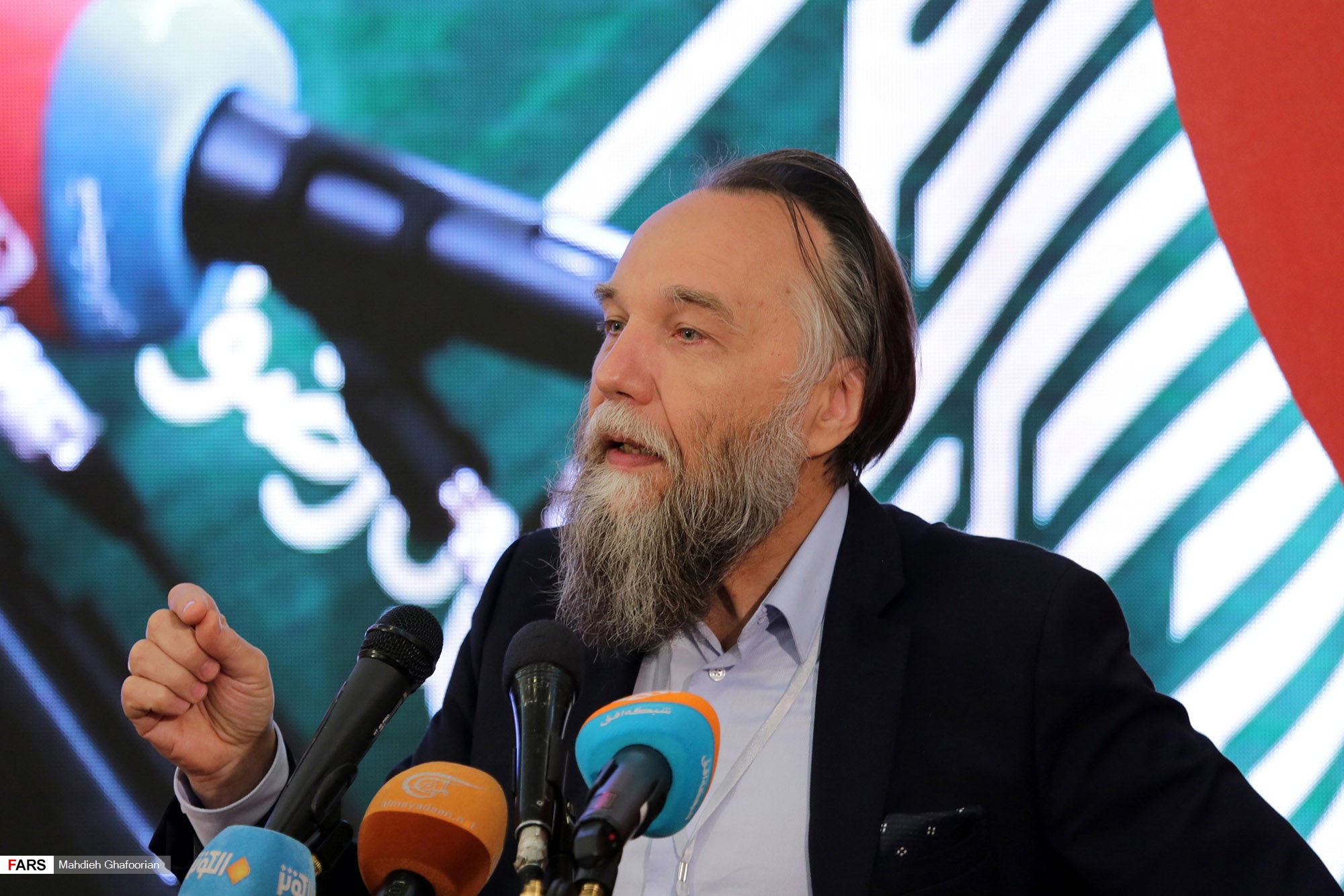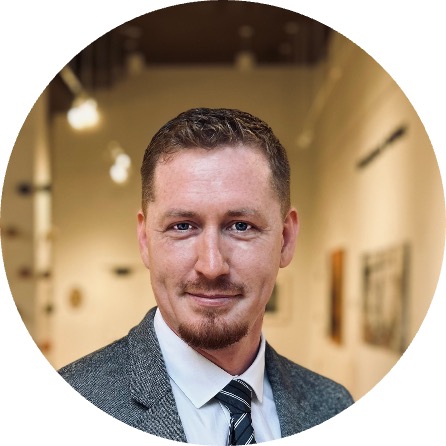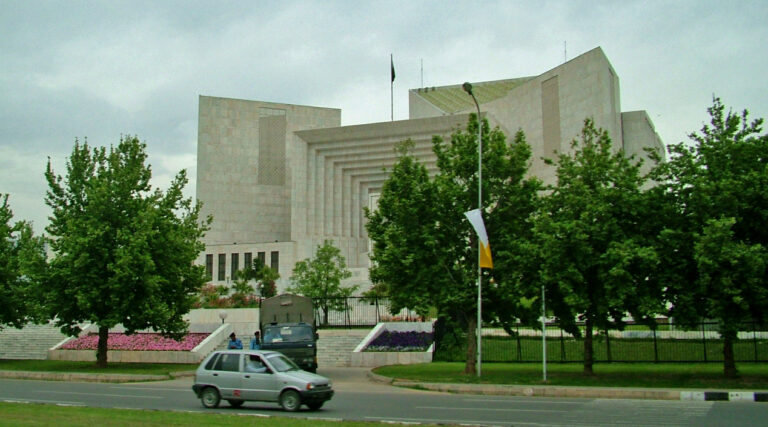
The Illiberalism of Aleksandr Dugin: Romantic Anti-Capitalism, Occult-Fascism, and the War in Ukraine
Thomas Jared Farmer
Photo of Aleksandr Dugin on Wikimedia by Mahdieh Gaforian (CC BY-SA 4.0).
Alexandr Dugin is a Russian ultranationalist political theorist and television commentator. He currently serves as the head of the newly established “Ivan Ilyin Higher School of Politics” (HSP) at the Russian State University for the Humanities (RSUH) in Moscow. In recent years, he has been variously dubbed “Putin’s brain,” “Putin’s Rasputin,” and “the most dangerous philosopher in the world.” A rightwing extremist, he is known for making inflammatory comments. In 2014, for example, he was dismissed from his then position as department chair for Sociology of International Relations at Moscow State University after publicly advocating for the death of Ukrainian citizens. Following his dismissal, he briefly served as chief editor for the pro-Kremlin television network, Tsargrad (owned by the oligarch Konstantin Malofeev). The network serves a similar propaganda function as FOX News in the U.S., voicing strong support for both the Russian state and the Orthodox Church. Since the Russian invasion of Ukraine, Dugin has seen his prominence as a public intellectual rise considerably—gaining increased notoriety (particularly abroad) for his strident pro-war sympathies. He has even voiced support for the use of nuclear weapons in the conflict in the event of a Russian loss. In August 2022, he survived an assassination attempt when a car-bomb detonated in the vehicle in which he was supposed to have been traveling. His twenty-nine-year-old daughter, Darya Dugina—herself a far-right political commentator—died in the explosion. Many of the details and motives for the attack remain unclear, though Russian and U.S. intelligence agencies suspect elements within the Ukrainian government to have been involved. Mykhailo Podolyak, an advisor to President Zelensky, has denied any official Ukrainian involvement, stating: “We are not a criminal state like Russia…And we are certainly not a terrorist state.”
For over thirty years—long before it was a mainstream position amongst the Russian elite—Dugin was advocating for the retaking of Ukraine and the reestablishment of a Eurasian sphere of influence centered in Moscow against the international hegemony of the West. While this irredentism made him a marginal figure throughout much of the 1990s, since the early 2000s, he has seen the Kremlin move steadily closer to many of his positions. This has been reflected not only in Putin’s territorial aggression but also through diplomatic efforts, like the 2015 establishment of the Eurasian Economic Union (EAEU) which saw 5 member-states—Russia, Belarus, Armenia, Kazakhstan, and Kyrgyzstan—integrating into a single market. Though a more comprehensive integration, similar to the EU, is not currently on the table.
Dugin’s seeming prescience in anticipating the rightward drift of Russian public opinion has led many in the Western media to view him as the ideological inspiration for Russia’s invasion of Ukraine or, more generally, as the intellectual architect of Putin’s expansionist ambitions. But are such comparisons warranted? Who is Dugin really? And how much influence does he actually wield in the Kremlin?
The son of a high-ranking Soviet officer and a physician, Dugin grew up affluent and well-connected. Despite this, he seems to have always been something of a contrarian. As a young man, for instance, he became part of the so-called “Iuzhinskii Circle,” a clandestine intellectual salon interested in controversial literature and esoterica. This association has led to the occasional claim in the media that Dugin formerly dabbled in Satanism. Though controversial at the time, today, the group’s activities would likely be dismissed as the behavior of “edgelords,” primarily concerned with their ability to scandalize middle-class values (épater la bourgeoisie). In 1979, Dugin began studies at the Moscow Aviation Institute, but was expelled in his second year. The exact reasons for the expulsion are not known. Nevertheless, he continued independent study. A capable autodidact and polyglot, his interests and beliefs remained connected to ideas derived from theosophy, western esotericism, occult-fascism, the Nouvelle Droite (New Right), and conspiracy theories. Indeed, he counts among his primary influences the works of perennialists like René Guénon, Mircea Eliade, Carl Jung, Titus Burckhardt, and Leopold Ziegler, but also more fringe thinkers such as Julius Evola, Aleister Crowley, and Karl Haushofer. In 1988, as an anti-communist dissident, he joined the National Patriotic Front (Pamyat, or “Memory”) Movement, an antisemitic neo-Monarchist political organization. Following the fall of the Soviet Union, he (along with Eduard Limonov) founded the National-Bolshevik Party, in an abortive effort to unify the far-left and far-right in opposition to the official western-backed liberalism of Boris Yeltsin. Critics charged that Dugin and other “Nazbols” were cynically attempting to co opt leftwing anti-capitalist/ pro-worker rhetoric for a Party that was little more than a stalking-horse for fascism. In 1995, he ran an unsuccessful campaign for a seat in the State Duma. In 1997, he published his first major work, Foundations of Geopolitics, with the possible support of Igor Rodionov and Leonid Ivashov (two leading military hardliners). The work was a bestseller and gained influence amongst some in military leadership and was adopted as a textbook by the Military Academy of the Russian General Staff. In 1998, Dugin left the National-Bolshevik Party. The following year, he finally received a university degree in the humanities from the Novocherkassk Engineering and Reclamation Institute. It was around this same time that he also attached himself to the “Old Believers” movement within Eastern Orthodoxy, considering it an acceptable compromise between the Russian Church and Neopaganism.
Considering all of the attention he has garnered for supposedly being “Putin’s brain,” one might be surprised to learn that Dugin is not actually an advisor to the Kremlin. Furthermore, he has never held any official position in the government. Indeed, there is not even evidence to date that he has ever so much as met Vladimir Putin. His closest proximity to actual power came in the early-2000s, when he was briefly an advisor to then-chairman of the state Duma, Gennadiy Seleznyov. As for the assassination attempt, Dugin and/or his daughter have not been the only pro-war propagandists targeted since the Russian invasion of Ukraine. In 2023, for example, two notorious mercenary-propagandists, Igor Mangushev and Maksim Fomin (better known as Vladlen Tatarsky), were both assassinated. Mangushev was shot in the head at a checkpoint in February, while Tatarsky was killed in an explosion as he spoke at a political event that April. Finally, since at least 2005, Dugin has often criticized Putin from the Right for not implementing a more thorough-going Eurasianist agenda. All that to say, while Dugin’s ideas are extreme and have gained some currency with certain members of the military leadership, they are not original. That the Kremlin has moved increasingly closer to the formerly marginal positions of hard-right factions within Russia is true. Nevertheless, there is little evidence to suggest that Dugin himself has been especially influential in this shift.
That said, even if Dugin is not the éminence grise behind Putin that some in the West have imagined, that doesn’t mean that he is insignificant (especially outside of Russia). Indeed, Dugin’s brand of virulent nationalism and mystical traditionalism has made him something of a cause célèbre amongst the international far-Right. For example, the French identitarian, Alain de Benoist, wrote the forward to the French edition of Dugin’s book, The Fourth Political Theory. The Canadian pop-psychologist, rightwing self-help guru, and Daily Wire contributor, Jordan Peterson, has been discussing Dugin since at least 2015 and has described him as a “genuine philosopher.” He has links to former KKK leader David Duke and Alt-Right leader Richard Spencer. He has been interviewed by conspiracy theorist Alex Jones. Benjamin Teitelbaum revealed in his book, War for Eternity (2020), that former Breitbart head, current WarRoom host, and convicted former Trump advisor, Steve Bannon, secretly met with Dugin in 2018. In April, Tucker Carlson’s network published an interview he conducted with Dugin back in February of this year. While the rightwing blogosphere is certainly no stranger to extremist philosophy cranks with similar ideas (e.g., Richard Spencer, Curtis Yarvin, Nick Land, etc.), unlike many of these figures, Peterson, Bannon, and Carlson especially straddle the fence of acceptability. Thus, they often act to launder ideas from the internet’s fever-swamps and inject them back into the conservative mainstream. Therefore, any increased visibility for an extremist figure like Dugin is troubling. That said, support for Dugin’s ideas has not been universally received on the Right. For example, former FOX host and founder of Blaze Media, Glenn Beck, who styles his own brand of conservatism as a form of classical liberalism, has sounded the alarm against fellow conservatives adopting Dugin as an ally.
With all that in mind, what then is the actual substance of Dugin’s worldview and how does it intersect with other emergent forms of far-Right Nationalism? In order to understand Dugin’s conception of geopolitics, it is perhaps necessary to first contextualize his positions. Since the collapse of the Soviet Union, tension and conflict have reemerged between the Russian Federation and the West. This is particularly true regarding increased western integration in those regions which had traditionally been within the sphere of Russian influence: The Baltic States, the Balkans, the Caucasus, and certain areas of central Europe (i.e., Poland, Hungary, Slovakia, and Czechia). Indeed, the inclusion of many of these states into NATO, coupled with the integration initiatives of the European Union and the eastward expansion of the North Atlantic Alliance, have left many Russians with the feeling of being hemmed in on all sides and threatened by western hegemony, despite the fact that many of these states have moved closer to the West precisely in order to protect their own independent sovereignty from Putin’s territorial ambitions.
While Russia has struggled against NATO’s expansions into those areas sometimes referred to within Russia as their “far abroad” (Зарубежье дальнее)—namely, Estonia, Latvia, Lithuania, and Georgia, they view western influence over their neighbors in the so-called “near abroad” (ближнее зарубежье)—Armenia, Moldova, Turkmenistan, Tajikistan, Uzbekistan, and Kyrgyzstan—as a completely unacceptable intrusion into Russian prerogatives. For example, the use of military bases in Kyrgyzstan and Uzbekistan by U.S. forces during the “War on Terror” led to years of persistent semi-open tensions between Russia and the United States. Unsurprisingly, Moscow continues to oppose the establishment of a U.S. military presence in central Asia.
Disputes over spheres of influence have only increased in recent years, with the most significant being the Russian-Georgian war of 2008, the Ukraine Crisis (2014), the subsequent annexation of Crimea, and the ongoing conflict in eastern Ukraine. These events have exacerbated tensions and contributed to a resurgence of Cold War-like dynamics between Russia and the West. Western imposed sanctions on Russia have further plunged relations into a deep crisis. In this ongoing rivalry, Georgia and Ukraine have obviously opted to align themselves with the West, while other neighboring countries such as Moldova and even Armenia are increasingly leaning towards European and American influences in their diplomacy. So, it was perhaps inevitable then that Dugin’s unapologetic irredentism would find wider currency as the chasm between Moscow and Washington widened. Though few could have perhaps predicted the degree to which Dugin’s anti-Western philosophy would find a ready audience amongst so many self-proclaimed western chauvinists. The key to understanding this apparent tension lies within Dugin’s so-called “Fourth Political Philosophy.”
Dugin’s philosophy is sometimes dismissed as being little more than fascism by another name or fascism with additional steps. In some sense this is true, but if we are going to understand the contours of Dugin’s “worldview,” we will perhaps be better served by thinking of it as a form of “Romantic anti-capitalism.” Romantic anti-capitalism is not a singular worldview. Rather, it is an umbrella-term representing the diverse set of non-Marxist critical responses to the emergence of modern industrial society predominantly organized along liberal political and capitalist economic structures. Unlike Marxism, which was from its inception future-oriented, romantic anti-capitalism offers a critique of contemporary life in favor of certain pre-capitalist cultural values and lifeways. Given the various forms such a critique could take, it can just as well be said to encompass the distinctive worldviews of those as diverse as Heidegger, Coleridge, Dickens, or even the Catholic Church. Central to understanding Dugin’s own particular brand of anti-western illiberalism—and his simultaneous eclectic embrace of Eurasianism, imperialism, perennialist philosophy, Neopaganism, Russian exceptionalism, the pre-modern Orthodox liturgy of the Old Believers, and even some expressed sympathy for forms of Islamic fundamentalism—is thus his rejection of modernity. His traditionalism emphasizes the importance of religion, hierarchy, and family (including traditional gender roles, opposition to sexual diversity, and a belief in the organic unity provided by ethnicity) in the stable functioning of society. Values that he believes are threatened by principles that emerged out of Modernity—such as liberal individualism, egalitarianism, which he associates with Socialism/Communism, and collectivization in the form of the State (Mussolini) or the Race (Hitler) which he equates with fascism. This is how Dugin’s philosophy can borrow concepts from the modern political philosophies of Liberalism, Communism, and Fascism while claiming to transcend them all. This is also how he can consistently attempt to make common cause with elements of the anti-liberal Left and Right (especially with a Catholic integralist like Bannon), while also being opposed to conservative Liberals like Beck. But, in truth, if one surveys what elements of leftwing and rightwing ideology Dugin is willing to retain in his traditionalism, his Fourth Political Philosophy has drastically more parallels with Fascism than it does with either Liberalism or Communism. ♦

Thomas Jared Farmer is the McDonald Scholar in Residence at the Center for the Study of Law and Religion at Emory University. He holds a BA in Philosophy from the University of Illinois, an MTS and Th.M. from Emory University’s Candler School of Theology, an MA in Philosophy as well as an MA in Religion from Claremont Graduate University and a PhD in the Philosophy from the University of Münster (Westfälische Wilhelms-Universität Münster).
Recommended Citation
Farmer, Thomas Jared. “The Illiberalism of Aleksandr Dugin: Romantic Anti-Capitalism, Occult-Fascism, and the War in Ukraine.” Canopy Forum, August 22, 2024. https://canopyforum.org/2024/08/22/the-illiberalism-of-aleksandr-dugin-romantic-anti-capitalism-occult-fascism-and-the-war-in-ukraine/
Recent Posts










